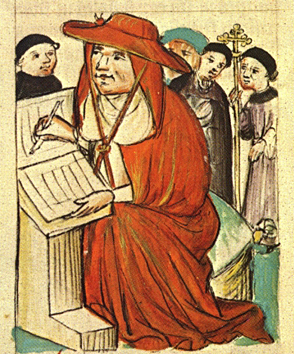In the database you will find
- Students of the higher faculties (laws, theology, and medicine) of the universities of the Empire, regardless of a graduation
- Masters or Licentiates of Arts
- Nobles who have been thus marked in the sources of the universities, regardless of a graduation.
It follows that you will not find students who did not graduate within the Empire or whose graduation has not been recorded in the analyzed documents or whose records have been lost.
The online database comprises 59,000 scholars who are traceable at the universities listed below within the indicated spans of time.
Systematically evaluated Universities
| Basel: | 1460 - 1550 |
| Erfurt: | 1392 - 1550 |
| Frankfurt: | 1506 - 1550 |
| Freiburg: | 1460 - 1500 |
| Greifswald: | 1456 - 1550 |
| Heidelberg: | 1386 - 1550 |
| Ingolstadt: | 1472 - 1550 |
| Köln: | 1389 - 1550 |
| Krakau: | 1400 - 1550 |
| Leipzig: | 1409 - 1550 |
| Löwen: | 1425 - 1527 (1550) |
| Mainz: | 1476 - 1550: Students according to the Student's register Professors of Theology |
| Marburg: | 1527 - 1550 |
| Prag: | Artisten-, Mediziner- und Theologenuniversität 1367-1450, Juristenuniversität 1372-1418 |
| Rostock: | 1419 - 1550 |
| Tübingen: | 1477 - 1550 |
| Wien: | 1377 - 1550, Artistenfakultät 1377 - 1550, Juristenfakultät 1402 - 1550, Theologische and medizinische Fakultät 1396/99 - 1550 |
| Wittenberg: | 1502 - 1550 |
Additional information on graduations are to be expected when we analyze sources from outside the universities and will be added to the database in due time. Likewise, more scholars are expected to be identified scrutinizing these sources.
Sources and Bibliography
Up until now the information has been collected from university sources, i.e. matriculas, graduation lists and documents of the university nations. Facts from additional sources have been added mainly for scholars originating from the lower and middle Rhine area. All publications and records consulted are listed in the bibliography (pdf).
Biographies
The scholars' biographies include data concerning matriculation, graduation and - if available - geographic and, although at the moment fragmentary, social origin.
Additionally, for some scholars you will find dates of birth, death, or marriage, data concerning professional careers (benefices, religious orders, etc.), as well as information on relationships (e.g. family relations). Data concerning the scholars' lives outside the universities are going to be collected in the following phases of the project. Links to other internetsources offering information on that particular scholar are listed at the end of the page.
.jpg)
.jpg)
.jpg)
.jpg)
.jpg)
.jpg)
.jpg)
